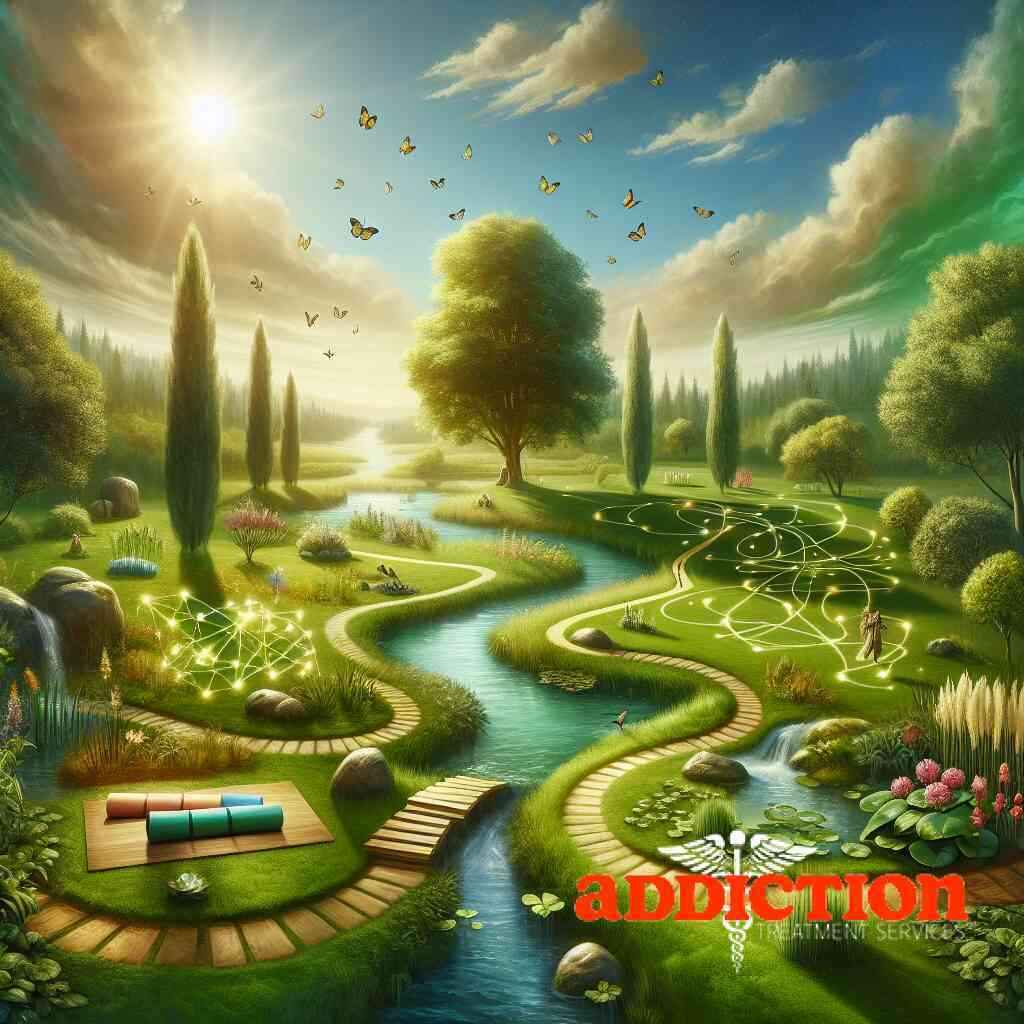 Posted On: 09/26/2024
Posted On: 09/26/2024Introduction to Holistic Addiction Treatment
Understanding the Concept of Holistic Recovery
A holistic recovery is a comprehensive approach to addiction treatment that addresses not only the physical symptoms of substance abuse but also the emotional, spiritual, and mental health of individuals. Unlike conventional methods that typically focus on detoxification and behavioral therapy, holistic recovery encompasses a variety of therapies designed to heal the whole person. Holistic therapy options integrate traditional treatments with alternative modalities to promote long-term wellness. Techniques such as yoga, acupuncture, meditation, and nutritional counseling are frequently incorporated to support recovery by alleviating stress, enhancing mental clarity, and improving overall body functions.
Why Choose Holistic Methods Over Traditional Therapies
Choosing holistic methods over traditional therapies is growing in popularity for several key reasons. Firstly, these methods often provide a more personalized and comprehensive treatment plan that caters to the needs of the individual rather than a one-size-fits-all approach. Secondly, by focusing on the mind, body, and spirit, holistic therapies help to establish a balance that can reduce the likelihood of relapse. Moreover, holistic approaches typically emphasize self-care and self-awareness, which are crucial for long-term sobriety. They encourage patients to take control of their recovery and to understand the underlying causes of their addiction deeply.
Overview of Benefits of Integrative Addiction Treatment
Integrative addiction treatment combines the best of both traditional Western medicine and holistic modalities to create a multifaceted approach tailored to individual needs. This type of treatment recognizes the complex nature of addiction, which often involves intertwined issues of mental health, physical health, and emotional distress. The benefits of integrative therapies are extensive. They usually include improved mental health through mindfulness in addiction treatment techniques, enhanced physical health through natural and nutritional interventions, and increased emotional well-being through therapies like art and music. Additionally, integrative approaches aim to empower individuals by offering skills and strategies that promote self-sufficiency in managing stress and triggers, which are essential for recovery. As such, integrative addiction treatment can often lead to more sustainable outcomes and a higher quality of life during and after recovery.
Core Components of Holistic Addiction Recovery Programs
Holistic addiction recovery programs offer a more encompassing approach compared to traditional treatment methods. They engage not only the physical aspects of addiction but also its psychological, emotional, and spiritual dimensions. These programs employ a variety of complementary therapies and practices aimed at healing the entire person. Here, we’ll explore the three key components that play vital roles in the effectiveness of holistic recovery.
Natural Addiction Recovery and Its Elements
Natural addiction recovery focuses on healing the body without the use of pharmacological interventions, harnessing the body’s inherent ability to heal itself. Essential elements often include herbal remedies, hydration therapy, and physical activities such as hiking or swimming, which help cleanse the body and boost overall health. By emphasizing therapies that are aligned with nature, individuals are given the tools to reconnect with their environment and find balance, making natural addiction recovery a cornerstone in holistic treatment.
Therapeutic diets are also paramount; they are tailored to restore nutritional deficiencies that may have arisen during periods of substance abuse. Embracing a clean, organic diet can significantly improve energy levels, cognitive function, and mood stability, which all support recovery efforts. Moreover, integrating practices such as therapeutic massage and chiropractic care helps to alleviate physical discomfort and boost the body’s overall healing process.
Role of Mindfulness and Meditation in Addiction Treatment
Mindfulness and meditation are pivotal in holistic addiction treatment, aiming to cultivate a deep sense of present-moment awareness, which can significantly reduce the stress and anxiety commonly associated with addiction recovery. Through regular practice, these techniques teach individuals how to observe their thoughts and feelings without judgment, fostering an understanding of the triggers and behavior patterns that may lead to substance use.
Meditation sessions, either guided or independent, provide a safe space for individuals to confront their emotions and develop healthier coping mechanisms. The consistent practice of mindfulness instills a greater sense of calm and emotional resilience, which is critical during the often tumultuous recovery phases. It also encourages a greater understanding of self-awareness and self-control, key components in maintaining sobriety and preventing relapse.
Importance of Nutritional Approaches in Substance Treatment
Nutrition plays a crucial role in the recovery process, as substance abuse often leads to significant nutritional deficiencies that can affect both physical health and mental well-being. Holistic treatment programs, therefore, emphasize the importance of a balanced, nutrient-rich diet to help repair the body and boost brain function.
Nutritional counseling is an integral part of holistic recovery, providing individuals with personalized dietary plans designed to replenish deficient nutrients and enhance overall health. Proper nutrition supports detoxification processes, strengthens the immune system, and improves mood and energy levels, all of which are essential for successful recovery. Moreover, understanding and implementing healthy eating habits can empower individuals in recovery, giving them a vital tool in their ongoing wellness journey.
Exploring Different Holistic Therapies
Acupuncture for Addiction
Acupuncture, a key component of traditional Chinese medicine, has been adapted into holistic addiction treatment due to its benefits in alleviating withdrawal symptoms and reducing cravings. This practice involves the insertion of fine needles into specific points on the body, aiming to restore balance and stimulate the body’s natural healing response. Research suggests that acupuncture can help regulate neurotransmitter activity, which plays a crucial role in addiction behaviors. By enhancing the body’s ability to cope with anxiety and stress, acupuncture provides a supportive aid in the recovery journey, making it a valuable part of holistic therapy options.
Yoga and Movement Therapies in Recovery
Yoga and other movement-based therapies are integral to holistic addiction recovery, focusing on the connection between physical and mental wellness. Yoga, which combines physical postures, breathing exercises, and meditation, has been shown to improve mental clarity, reduce stress, and enhance overall emotional resilience. Classes tailored for addiction recovery can help individuals develop a deeper awareness of their body and emotional states, facilitating a more stable recovery process. Movement therapies in holistic recovery not only strengthen the body but also promote mindfulness, which is crucial in managing impulses and maintaining long-term sobriety. Addiction and yoga therapy in New York offers specialized programs that integrate these principles effectively.
Biofeedback Techniques and Substance Abuse
Biofeedback is an innovative therapy in the field of addiction treatment that involves teaching individuals to control bodily processes that are typically involuntary, such as heart rate, muscle tension, and blood pressure. Through biofeedback for addiction recovery, clients learn to harness the power of their mind to influence physical responses, which can be particularly beneficial in managing the symptoms of withdrawal and stress. Biofeedback devices provide real-time feedback, helping individuals understand the physical manifestations of stress and anxiety and enabling them to develop techniques to control these responses. This practice supports holistic recovery by promoting a high degree of body awareness and control, which is essential in overcoming substance abuse.
Art and Music Therapy for Emotional Expression
Art and music therapy offer powerful avenues for expression and healing in addiction treatment. These therapies encourage creative expression, which can be particularly therapeutic for individuals who may struggle with traditional forms of communication. Engaging in art or music allows for the exploration and release of emotions, fostering healing from trauma and conflict often associated with addiction. Art and music therapy can boost self-esteem, provide a sense of accomplishment, and offer a non-verbal outlet for emotions. As part of holistic addiction treatment, these creative therapies are utilized to enhance emotional and psychological recovery, helping individuals explore new hobbies and stress-relief techniques that support a sober lifestyle.
Integrative Practices for Mental and Spiritual Healing
Addiction Spiritual Healing and Its Impact
Spiritual healing plays a crucial role in holistic addiction treatment. It encompasses a wide array of practices designed to align an individual’s spiritual well-being with their physical and mental health. Such approaches recognize the profound impact of spiritual peace on overall recovery and resilience against addiction. Techniques may include meditation sessions, spiritual counseling, and the incorporation of religious or spiritual rituals that resonate with the individual. The benefit of this integration is that it addresses the existential queries and the inner spiritual conflicts often neglected by conventional therapies, fostering a stronger recovery foundation. This component reinforces the belief that reconnecting with one’s spirituality can significantly enhance the capacity to cope with the challenges of addiction.
Holistic Mental Health Care Approaches
In holistic addiction treatment, mental health care is not seen as a separate entity but as an integral part of the healing process. Holistic mental health care centers incorporate various non-conventional methods such as art and music therapy, yoga, and meditation to support psychological healing. These centers aim to treat mental health issues like anxiety, depression, or PTSD, which frequently accompany addiction. The synergy between traditional mental health treatments and holistic modalities offers a more comprehensive approach, ensuring that care is both inclusive and individualistic. By facilitating therapies that nurture the mind, holistic programs provide tools that help patients manage thoughts and emotions effectively, crucial in mitigating the risk of relapse.
Using Holistic Therapy to Address Underlying Psychological Issues
Holistic therapy goes beyond managing symptoms of addiction; it seeks to uncover and address the root cause of substance abuse, by emphasizing the connectivity of mind, body, and spirit, therapies like biofeedback, acupuncture, and guided meditation focus on uncovering underlying psychological issues. These practices help individuals gain deeper insights into their emotional triggers and behavioral patterns, promoting long-lasting recovery. Furthermore, holistic therapy fosters personal growth by encouraging self-reflection and offering strategies for rebuilding one’s life with new, healthy coping mechanisms. The ability to address these underlying issues holistically reduces the dependence on substances as a form of escapism or self-medication, setting the stage for a sustainable recovery.
Holistic Detox Programs and Withdrawal Management
Non-Medical Detoxification Services
Holistic detox programs prioritize non-medical methods to support the body’s natural detoxification processes during addiction recovery. These programs often incorporate herbal treatments, hydration therapy, and physical exercises like yoga or tai chi, specifically designed to help remove toxins from the body in a gentler way than traditional medical detoxification. The emphasis is on creating a healing environment that supports the entire well-being of the individual, both mentally and spiritually. This approach aims to alleviate withdrawal symptoms by using natural healing methods, making them more tolerable for those in recovery.
Managing Withdrawal Symptoms Using Natural Remedies
Withdrawal symptoms can be one of the most challenging aspects of addiction recovery. Holistic detox programs utilize a variety of natural remedies to ease these symptoms and promote a balanced recovery. From acupuncture, which has been shown to reduce cravings and alleviate withdrawal symptoms, to the use of essential oils and herbal supplements for stress relief and sleep support, these methods aim to provide relief without the use of pharmaceuticals. Nutritional counseling also plays a crucial role, as it helps to correct any deficiencies and boost overall health during the detox phase.
Furthermore, holistic detox programs near me emphasize the importance of hydration and engaging in light physical activities, which can significantly aid the body’s natural detox processes. These interventions are carefully monitored to ensure they meet the specific needs and conditions of individuals, making each detox experience as effective and comfortable as possible.
Early Intervention and Holistic Support During Detox
Early intervention in holistic detox programs is crucial for preventing the worsening of addiction-related issues and improving long-term recovery outcomes. From the moment an individual decides to seek help, holistic recovery centers provide comprehensive support that encompasses physical health assessments, emotional counseling, and spiritual guidance. This proactive approach not only helps in managing the immediate withdrawal symptoms but also addresses underlying issues that contribute to the addiction.
Holistic support during detox often includes individual and group therapy sessions, mindfulness and meditation practices, and spiritual or pastoral counseling, depending on the individual’s preferences. These therapies are designed to provide emotional reassurance and psychological strength, equipping individuals with the resources and resilience needed to continue their journey to recovery. Holistic detox programs view early intervention not just as a crisis response but as a transformative process that fosters empowerment, self-awareness, and a deeper sense of purpose.
Real-Life Applications in Different States
Holistic Addiction Treatment Services in California
California is a hub for innovative approaches to addiction recovery, and holistic addiction therapies in California have garnered significant attention for their effectiveness. The state’s mild climate and abundant natural landscapes offer an ideal environment for recovery facilities that use holistic methods. From coastal retreats to mountain hideaways, these centers integrate traditional treatment protocols with nature-based therapies, yoga, meditation, and organic nutrition plans. The diverse demographic and cultural richness of California also allows for tailored programs that respect and incorporate the cultural backgrounds of individuals, making the treatments not only more comprehensive but also deeply personal and respectful of individual identities.
Holistic Substance Treatment Services in New York
New York State, known for its bustling cities and diverse populations, presents unique challenges and opportunities in the field of addiction recovery. Holistic substance treatment services in New York focus on the integration of urban-centric therapeutic activities like rooftop gardening, urban beekeeping, and community-centered therapy groups. Additionally, many centers offer workshops on stress management that are uniquely designed for the high-paced lifestyle typical of New Yorkers. These programs aim to provide relief and recovery through a blend of traditional and holistic approaches, emphasizing community building and individual empowerment, crucial for sustained recovery in a challenging urban environment.
Case Studies: Improvement and Effectiveness Across the States
Examining the effectiveness of holistic addiction treatment across various states reveals inspiring success stories and measurable improvements in recovery rates. Case studies often highlight individuals who have benefited from integrative approaches tailored to their specific needs. For instance, in states like Colorado and Washington, outdoor-based therapy, including hiking and nature walks, is combined with cognitive-behavioral therapy to treat individuals with dual diagnoses. These cases show significant improvement in mental health and a decrease in relapse rates compared to traditional methods alone.
In Florida, holistic recovery centers emphasize the role of spirituality and community support, coupled with therapies like music and art, to enhance the recovery process. Success stories from these centers often include individuals who have overcome long-term dependencies and have successfully reintegrated into their communities, leading fulfilling lives. These real-life cases underscore the benefits of a holistic approach, which not only focuses on ceasing substance use but also on improving overall quality of life and mental health, laying a strong foundation for enduring wellness.
Conclusion: Embracing Holistic Methods for Long-Term Recovery

Summarizing the Benefits of Whole-Person Treatment Approaches
Holistic addiction treatment encompasses a broad spectrum of practices, each targeted not just towards overcoming addiction but also fostering a wholesome rejuvenation of the mind, body, and spirit. The benefits of whole-person addiction treatment are manifold, demonstrating significant advancements from traditional methods. This methodology supports various facets of an individual’s health, recognizing that long-term recovery is rooted in comprehensive care. Healing begins with the physical detoxification process and extends to emotional resilience and spiritual renewal. As such, participants in holistic programs often report greater satisfaction and lower rates of relapse, equipped not only to abstain from addictive substances but also to thrive in their daily lives.
How to Choose the Right Holistic Treatment Facility
Selecting the right holistic treatment facility is a pivotal decision, one that requires thoughtful consideration of several factors to ensure that the program aligns with the individual’s specific needs and values. Begin by assessing the accreditation and qualifications of the facility to ensure high standards of care. Explore the range of therapies offered – a good holistic center should provide a blend of traditional and alternative addiction therapies to cater to diverse needs. Consider patient testimonials and success rates, as these can give deeper insights into the effectiveness of their programs. Essential considerations should also include the location, as a serene and natural environment can significantly enhance the healing process. Lastly, verify if the program offers customized treatment plans, allowing adjustments based on individual progress.
Future Directions in Holistic Addiction Treatment
Looking ahead, holistic addiction treatment is poised to undergo significant evolution. As we continue to understand more about the underlying causes of addiction, treatment approaches are likely to become even more personalized and integrated. Innovations in the field may include the broader use of technology, such as virtual reality and AI-based therapies, to simulate and manage environments and situations that may trigger relapse. Additionally, there will likely be a greater emphasis on community-based recovery programs that leverage local resources for ongoing support. As research progresses, so too will the integration of newer alternative addiction therapies, potentially including emerging natural remedies and advanced biofeedback techniques. Understanding and leveraging these directions will be crucial for professionals and families seeking the most effective and compassionate care in addiction treatment.
By focusing on holistic methods and ensuring a pragmatic approach to its evolving nature, addiction treatment can provide more than mere recovery; it can offer a transformative life experience fostering sustained health and happiness.
Frequently Asked Questions
Question: What holistic addiction treatment options are available for someone beginning their journey to recovery?
Answer: At Addiction Treatment Services, we offer a wide range of holistic addiction treatment options designed to suit different recovery paths. These include natural addiction recovery methods, mindfulness practices, yoga and other movement-based therapies, nutritional counseling, and integrative addiction treatment combining traditional and alternative therapies. Each of these programs aims to nourish the body, mind, and spirit, supporting a comprehensive healing process. By incorporating these varied approaches, we ensure a personalized and effective experience that aligns with each individual’s unique needs.
Question: How do holistic mental health care approaches enhance the recovery process in the ‘Ultimate Guide to Holistic Addiction Treatment’?
Answer: Holistic mental health care approaches play a crucial role in the recovery process by integrating therapeutic modalities that focus on the entire being. Addiction Treatment Services incorporate therapies such as art and music therapy, meditation, and yoga to address mental health issues commonly associated with addiction, such as anxiety, depression, and PTSD. These practices not only alleviate psychological distress but also enhance emotional resilience and promote a deeper understanding of the self, which is vital for sustained recovery.
Question: Can you explain how holistic detox programs manage withdrawal symptoms effectively?
Answer: Our holistic detox programs at Addiction Treatment Services prioritize natural and gentle ways to cleanse the body, helping alleviate the discomfort associated with withdrawal symptoms. Techniques such as acupuncture, herbal supplements, essential oils, and tailored nutritional plans support the body’s own detox processes. Additionally, practices like yoga and hydration therapy contribute to a more tolerable detoxification experience. These methods help balance the body’s physical and emotional state, easing the withdrawal process without reliance on pharmaceuticals.
Question: What makes Addiction Treatment Services a trusted provider of holistic substance treatment services?
Answer: Addiction Treatment Services is renowned for its comprehensive, personalized approach to addiction recovery. We’re not just a directory; we offer a lifeline for individuals grappling with substance use disorders by providing detailed, accessible information and services tailored to meet diverse needs. Our holistic substance treatment services are underpinned by certified and experienced professionals who utilize evidence-based, innovative approaches combined with traditional therapies. Our commitment to supporting every step of the recovery journey, from the initial detox to long-term maintenance, establishes us as a trusted leader in the field.
Question: How does the ‘Ultimate Guide to Holistic Addiction Treatment’ ensure it aligns with up-to-date practices in holistic recovery?
Answer: The ‘Ultimate Guide to Holistic Addiction Treatment’ at Addiction Treatment Services is continually updated to reflect the latest research and best practices in holistic recovery. We collaborate with experts in the field to provide cutting-edge, scientifically supported strategies that integrate modern technology, such as biofeedback and advanced nutritional support. Our guide not only focuses on current methodologies but also anticipates future trends in addiction treatment, ensuring our clients receive the most effective and progressive care available.



